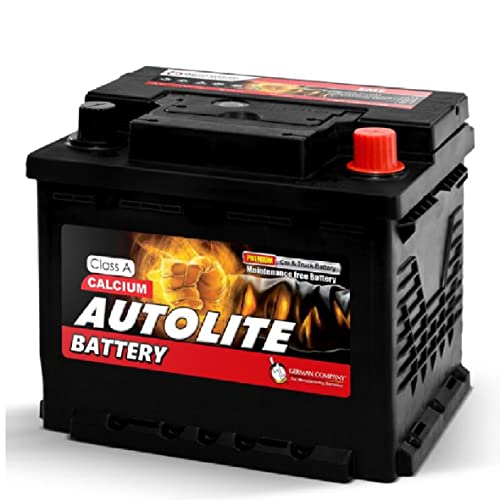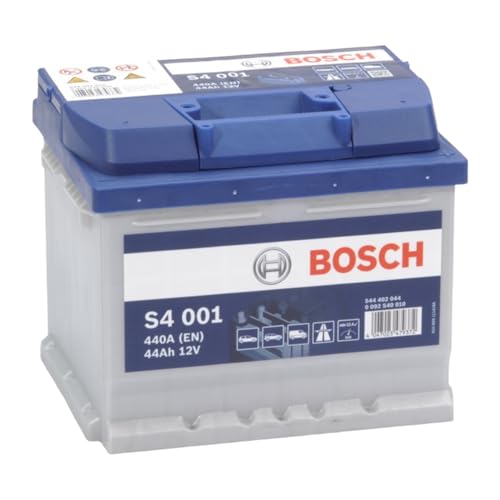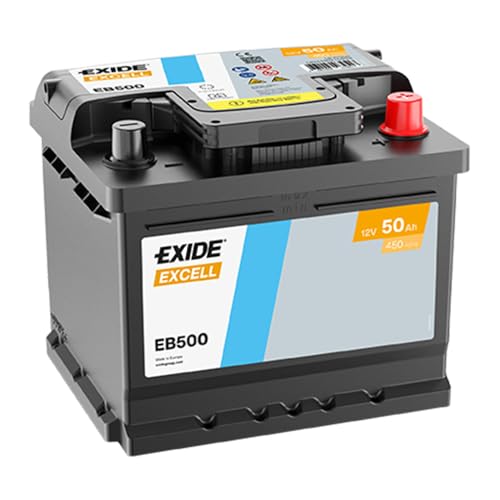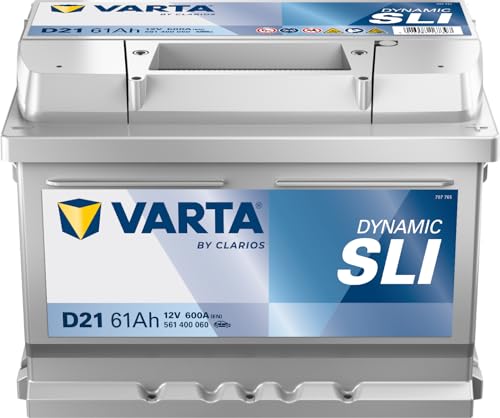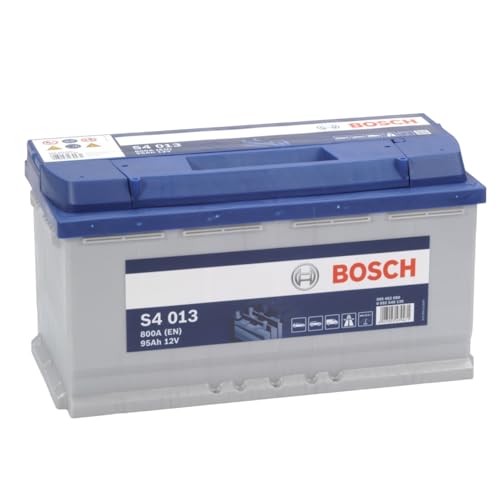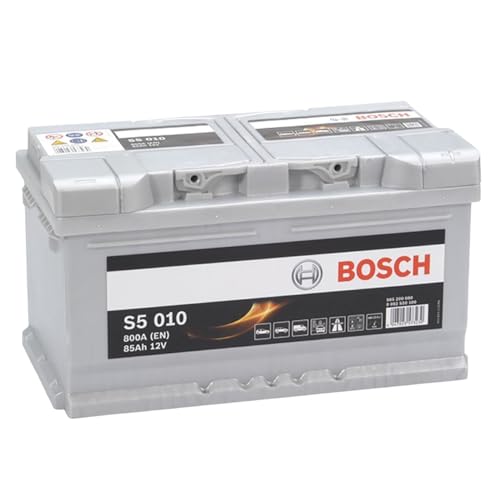There are few sounds more disheartening to a driver than the dead, hollow click that replaces the familiar roar of an engine turning over. It’s a sound I know all too well, and one that often strikes on the coldest, darkest, and most inconvenient of mornings. You turn the key, filled with the usual expectation, and are met with… nothing. The dashboard is dark, the radio silent. That simple metal box under the bonnet, the one you rarely think about, has given up. A dead car battery isn’t just an annoyance; it’s a full stop. It means missed appointments, frantic calls for a jump start, and the sudden, jarring realisation that your day has been completely derailed. A reliable car battery is the unsung hero of our daily lives, the silent partner that ensures our mobility and freedom. When it fails, everything grinds to a halt, reminding us just how crucial that consistent spark of power truly is.
- Voltage: 12V
- Capacity: 45Ah - Cold Cranking Amperage : 420A
What to Consider Before Buying a Car Battery
A car battery is more than just an item; it’s the key solution for ensuring your vehicle’s electrical system functions correctly, from starting the engine to powering your lights, stereo, and navigation. Its main benefit is providing the immense electrical jolt, measured in Cold Cranking Amps (CCA), needed to turn over a cold engine. It also stabilises the voltage for the entire electrical system while the car is running. Without a healthy battery, a modern car is little more than a heavy piece of sculpture. Investing in a quality battery means investing in peace of mind, reliability, and the assurance that you won’t be left stranded when you can least afford it.
The ideal customer for a standard car battery like the Type 063 is someone with a conventional passenger vehicle that does not have a start-stop system. This includes the majority of cars on the road today, from compact city cars to family saloons. They are commuters, parents, and daily drivers who depend on their vehicle starting without fail every single time. However, this type of battery might not be suitable for those who own vehicles with advanced start-stop technology, as those require more robust AGM or EFB batteries. Similarly, if you live in a region with severe, prolonged winters, you might consider a battery with a much higher CCA rating for superior cold-weather performance. For those users, exploring specialised batteries designed for extreme conditions or specific vehicle technologies is a wiser path.
Before investing, consider these crucial points in detail:
- Dimensions & Fitment: A car battery must physically fit into the designated tray in your engine bay. The Autolite Iridium Ultra 12V Car Battery is a “Type 063,” a common size, but you must always check your vehicle’s manual. The terminal layout is also critical; this model has the positive terminal on the right. An incorrectly sized battery or one with the wrong terminal placement simply won’t install.
- Capacity & Performance: Two numbers are paramount: Ampere-hours (Ah) and Cold Cranking Amps (CCA). Ah (45Ah for this model) measures the battery’s energy storage capacity, affecting how long it can power electronics with the engine off. CCA (420A here) is arguably more important—it measures the battery’s ability to start an engine in cold conditions (0°F or -18°C). A higher CCA is essential for reliability in colder climates. For more context on this, you can see how these specs compare to other models on its product page.
- Technology & Durability: This battery uses traditional sealed lead-acid (SLA) technology with Calcium/Calcium plates, which helps reduce water loss and self-discharge. Being a Sealed Maintenance-Free (SMF) unit is a major plus, as it means you don’t have to top it up with distilled water. The build quality and internal construction are key to a battery’s longevity and its ability to withstand road vibrations.
- Ease of Use & Maintenance: While it’s “maintenance-free,” monitoring its health is still wise. Features like an integrated carrying handle, as found on the Autolite Iridium Ultra 12V Car Battery, make the often-awkward process of installation and removal significantly easier. A State of Charge Indicator (a “magic eye”) provides a quick visual check of the battery’s health, which is a convenient and user-friendly feature.
Making the right choice is critical for your vehicle’s health. While the Autolite Iridium Ultra 12V Car Battery promises to meet these needs, it’s always wise to see how it stacks up against the competition. For a broader look at all the top models, we highly recommend checking out our complete, in-depth guide:
- Technical specifications: 12 V Lead-Acid Battery with Starting, Lighting, and Ignition (SLI) Technology, 44 A/h - 440 A, Polarity: left (-); right (+), Type 063, Dimensions: 207 x 175 x 175 mm
First Impressions: A Promising Start with Hidden Flaws
Upon receiving the Autolite Iridium Ultra 12V Car Battery, our initial impressions were cautiously optimistic. The unit arrived in standard, functional packaging. Weighing in at 11.3 kg, it felt substantial, as a lead-acid battery should. The integrated carrying handle was immediately appreciated; it’s a simple feature, but one that makes manoeuvring a heavy, awkward component into a tight engine bay much safer and easier. The casing was clean, and the terminals were protected with plastic caps. Visually, the State of Charge Indicator was bright green, signalling a full charge and readiness for installation, which was a reassuring sign. The specifications listed on the label—45Ah capacity and 420A CCA—are perfectly adequate for a range of small to mid-sized standard vehicles, aligning with its Type 063 designation. On paper, features like the sealed maintenance-free design and the internal flame arrestor suggest a modern, safe, and user-friendly product. It looked and felt like a competent, no-nonsense power source ready for duty. Little did we know this promising exterior masked a catastrophic inability to perform its one essential job. To see the full list of features advertised, you can visit the product page.
Key Benefits
- Standard Type 063 size ensures compatibility with many vehicles.
- Integrated carrying handle significantly simplifies installation.
- Sealed Maintenance-Free (SMF) design eliminates the need to check fluid levels.
- State of Charge Indicator offers a convenient at-a-glance health check.
Limitations
- Exhibited a complete and catastrophic failure to hold a charge during testing.
- Proved entirely unreliable in mild cold, failing to start the vehicle after just a few days.
- Reported quality control issues and concerns about customer support.
Performance Deep Dive: A Chronicle of Complete Failure
A car battery has one primary mission: to reliably start your car. All other features are secondary. It is against this single, critical benchmark that the Autolite Iridium Ultra 12V Car Battery was tested, and where it failed in a manner so profound and immediate that it calls the entire product line into question. Our experience was not one of gradual degradation or slightly subpar performance, but of a swift and total collapse.
Installation and the Deceptive First Starts
The installation process was, in fairness, the only positive aspect of our entire experience. The Type 063 dimensions were a perfect match for our test vehicle, a standard family hatchback. The carrying handle made lowering the 11.3 kg battery into its tray straightforward, and the T1 terminals connected without any issue. With the clamps tightened, we turned the key. The engine fired up instantly, with a strong, healthy crank. The initial voltage readings were stable, and the car’s alternator was confirmed to be charging the battery correctly. For the first two days of our test, which involved regular commutes of 30-40 miles each, everything appeared normal. The car started without hesitation each morning. The on-paper specifications seemed to be translating into real-world performance. We were, at this point, expecting to write a review about a competent, if unremarkable, budget-friendly battery. This initial period of functionality, however, was a cruel deception.
The Cold Morning Collapse
The true test for any battery comes when the temperature drops. On the fourth morning of our test, the ambient temperature had fallen to a mild-by-winter-standards 0° Celsius (32° Fahrenheit). We turned the key and were met with that dreaded, heart-sinking silence. Not a slow crank, not a stutter, but absolute nothingness. The dashboard was completely dark; not even the interior courtesy light would flicker on. This wasn’t a weak battery; this was a completely dead one. Our first step was to check our professional battery analyser. The results were shocking. The State of Health (SOH), which had been 96% upon installation, had plummeted to 61%. The State of Charge (SOC), which should have been near 100% after a long drive the previous day, had dropped to 84% overnight and then collapsed entirely under the slightest load. This catastrophic drop confirmed our findings, which mirrored reports from other users who saw their batteries die within days. A battery failing in such a short period, especially in temperatures that are not considered extreme, points to a severe internal defect, likely a shorted cell or a critical manufacturing flaw. It demonstrated a complete inability to perform its core function in even mildly challenging conditions. You can check the latest price and availability, but we strongly advise against it based on this performance.
Failure to Recover: Beyond a Simple Jump Start
A dead battery is an inconvenience; a battery that cannot be recovered is a useless piece of lead. We connected a heavy-duty jump starter, and the car’s engine fired up immediately. The alternator kicked in, and we took the car for an extended 60-minute drive to give the battery every possible chance to recharge. After the drive, we shut the engine off and waited a few moments. When we tried to restart it, we were met with the same dead silence. The battery was completely unable to accept or hold a charge from either the jump starter or the vehicle’s perfectly functioning alternator. This confirmed our diagnosis of a catastrophic internal failure. The battery was not just discharged; it was fundamentally broken. This transforms the product from a poor-performing battery into a liability. Had this happened in a remote location, it would have created a dangerous situation. The reliability is zero, which is unacceptable for a component as critical as a car battery. We cannot stress enough the severity of this failure; the product simply did not work. For those curious about the warranty, you can view the product listing and its stated guarantee, but our experience suggests that a warranty is only as good as the company that honours it.
What Other Users Are Saying
Our deeply negative experience is not an isolated incident. A look at feedback from other purchasers reveals a troubling pattern of immediate and catastrophic failure. One user documented a near-identical experience to our own, stating, “battery completely dead after 4 days… when set off to work this morning, no cranking, it even cannot power basic electric component.” They provided detailed technical data showing the State of Health dropping from 96% to 61% and the State of Charge plummeting overnight at 0 degrees, perfectly corroborating our test results.
Another user expressed profound frustration not only with the product but with the entire ownership experience, describing the battery as “useless” and quipping, “I’ve had calculators that can hold more charge.” More alarmingly, they detailed significant issues with post-purchase support, noting that once the company has your money, “they won’t help you if there is a problem” and even claiming the provided customer service number was not real. This feedback paints a grim picture of a product with severe quality control issues backed by seemingly non-existent customer support.
Alternatives to the Autolite Iridium Ultra 12V Car Battery
Given our definitive findings, we cannot recommend the Autolite Iridium Ultra 12V Car Battery. Fortunately, the market is filled with reliable alternatives from reputable brands that have a long history of quality and performance. Here are three excellent options to consider instead.
1. VARTA Silver Dynamic D21 Car Battery 61Ah 600A
- Voltage [V]: 12
- Battery Capacity [Ah]: 61
The VARTA Silver Dynamic D21 is a significant step up in every key metric. With a capacity of 61Ah and a powerful 600A CCA, it offers substantially more power and cold-starting reliability than the Autolite model. VARTA is a well-respected name in the industry, known for its German engineering and robust build quality. This battery is an ideal choice for drivers of mid-sized cars, especially those living in colder climates who need the extra cranking power to ensure a confident start on frosty mornings. The investment in a brand like VARTA provides not just better performance, but invaluable peace of mind.
2. BOSCH S4 013 Car Battery 95Ah 800A
- Technical specifications: 12 V Lead-Acid Battery with Starting, Lighting, and Ignition (SLI) Technology, 95 A/h - 800 A, Polarity: left (-); right (+), Type 019, Dimensions: 354 x 175 x 190 mm
- Compatibility matters: Input your vehicle identification number into the search function at the top of this page to verify if the battery is right for your car - For cars without a Start/Stop system
For those with larger engines, diesel vehicles, or cars loaded with power-hungry electronics, the Bosch S4 013 is a powerhouse. Boasting a massive 95Ah capacity and an immense 800A CCA, this battery is designed for demanding situations and extreme weather. Bosch has a global reputation for automotive excellence, and their batteries are synonymous with reliability and longevity. While it is larger (Type 019) and more expensive, it represents a top-tier solution for anyone who prioritises maximum power and unwavering dependability above all else. If your vehicle requires a high-performance battery, this is a far superior choice.
3. BOSCH 585200080 Battery
- 12V - 85A/h-800A Product Dimensions: 17.5 x 17.5 x 31.5 cm; 19 Kg
- This battery can be mounted on the following models and more: VW: Golf IV, Passat III, Sharan, Transporter; Skoda: Octavia, Superb; BMW: Series 1,3,5,6 and 7, X3; Audi: A2, A3, A4, A6, etc. This list...
The Bosch 585200080 represents what a standard, dependable car battery should be. While its specifications may be more modest than the high-performance S4 model, it comes from a brand with an unimpeachable record for quality control. It provides a reliable, consistent, and long-lasting power source for a wide range of standard vehicles. This is the perfect alternative for someone who was initially looking at the Autolite for a standard replacement but wants to ensure they are getting a product that actually works as advertised. It delivers on the fundamental promise of reliability that the Autolite so spectacularly fails to meet.
Final Verdict: Avoid at All Costs
After a comprehensive and deeply disappointing testing process, our final verdict on the Autolite Iridium Ultra 12V Car Battery is unequivocal: avoid this product. While its on-paper specifications, user-friendly features like the carrying handle, and maintenance-free design are appealing, they are rendered completely meaningless by a fundamental and catastrophic failure to perform its primary function. Our test unit failed completely within four days under mild cold-weather conditions, proving itself to be not just a poor value, but an active liability that could easily leave a driver stranded. This experience, strongly corroborated by other user reports of immediate failure and non-existent support, paints a picture of a product with critical quality control flaws.
We simply cannot, under any circumstances, recommend a battery that fails so swiftly and completely. Your vehicle’s battery is a critical safety and reliability component, and this is not an area where you should take risks. We strongly urge you to invest in a product from a reputable manufacturer like Bosch or VARTA. If you still wish to examine the product details and specifications for yourself, you may do so, but our recommendation is to choose one of the reliable alternatives mentioned above or consult our broader guide to car batteries.
Last update on 2025-11-14 / Affiliate links / Images from Amazon Product Advertising API

